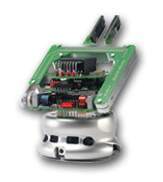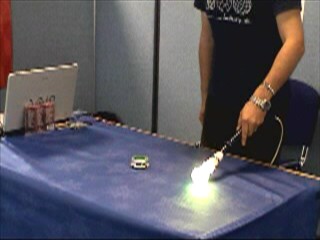Machine Intelligence Prize
The 2005 Fourth British Computer Society's Annual Prize for Progress towards Machine Intelligence sponsored by Electrolux has been won by IFOMIND, a mobile robot system that demonstrates intelligence as it meets a new object in its world.
Based on Khepera, a robot commercially available from K-Team, the machine intelligence system was designed and programmed by a team led by Professor David Bell from Queens University, Belfast.
IFOMIND reacts initially in an 'instinctive' way to its first perception of an unknown object that it encounters; at first it is generally fearful. However, because the robot is equipped with a human-like capability of inquisitiveness, it realises that it can react in another way and does not have to be scared of something that may not be harmful to it. So, the robot observes the object from a distance and takes note of how it behaves and how it reacts to different approaches; the robot is then able to decide on the best approach– or whether to avoid it. This knowledge can then be retained by the robot as it carries on and meets many more objects. This is a remarkable leap forward in the domain of Machine Intelligence as IFOMIND is able to use logical thought processes in order to decide the best way to interact with the objects that it meets.
Intelligence as IFOMIND is able to use logical thought processes in order to decide the best way to interact with the objects that it meets.
David Bell from the IFOMIND team explains, "A system that can observe events in an unknown scenario, learn and participate as a child would is a major challenge in AI. We have not achieved this, but we think we've made a small advance." - David Bell
BCS Machine Intelligence Prize: "Prize for Progress towards Machine Intelligence"

Based on Khepera, a robot commercially available from K-Team, the machine intelligence system was designed and programmed by a team led by Professor David Bell from Queens University, Belfast.
IFOMIND reacts initially in an 'instinctive' way to its first perception of an unknown object that it encounters; at first it is generally fearful. However, because the robot is equipped with a human-like capability of inquisitiveness, it realises that it can react in another way and does not have to be scared of something that may not be harmful to it. So, the robot observes the object from a distance and takes note of how it behaves and how it reacts to different approaches; the robot is then able to decide on the best approach– or whether to avoid it. This knowledge can then be retained by the robot as it carries on and meets many more objects. This is a remarkable leap forward in the domain of Machine
 Intelligence as IFOMIND is able to use logical thought processes in order to decide the best way to interact with the objects that it meets.
Intelligence as IFOMIND is able to use logical thought processes in order to decide the best way to interact with the objects that it meets.David Bell from the IFOMIND team explains, "A system that can observe events in an unknown scenario, learn and participate as a child would is a major challenge in AI. We have not achieved this, but we think we've made a small advance." - David Bell
BCS Machine Intelligence Prize: "Prize for Progress towards Machine Intelligence"
0 Comments:
Post a Comment
Subscribe to Post Comments [Atom]
<< Home